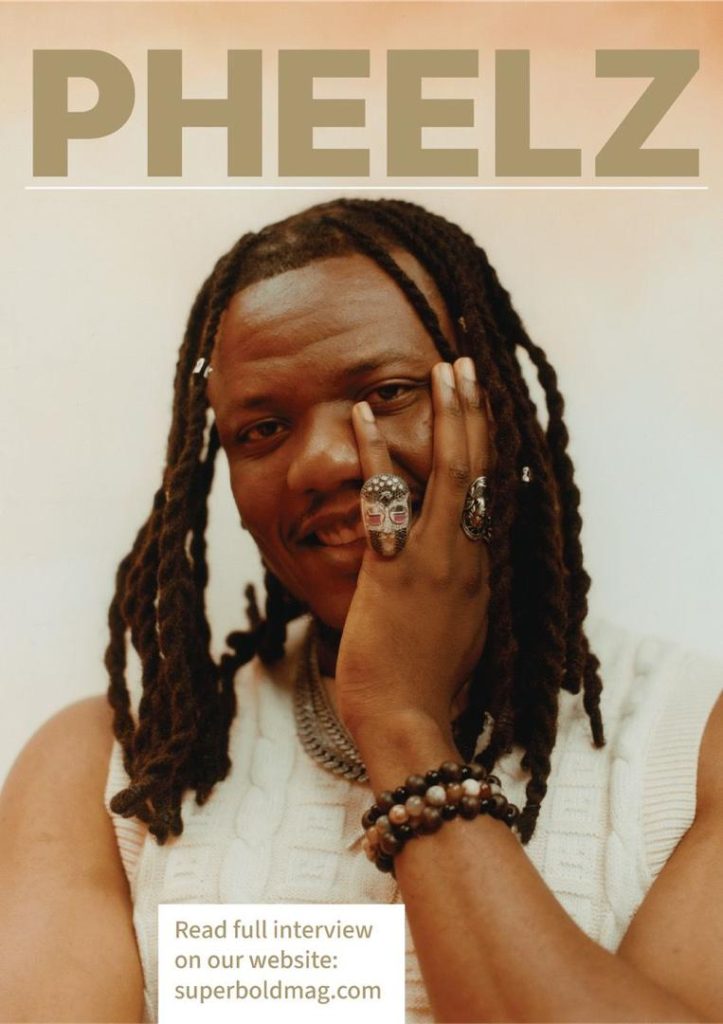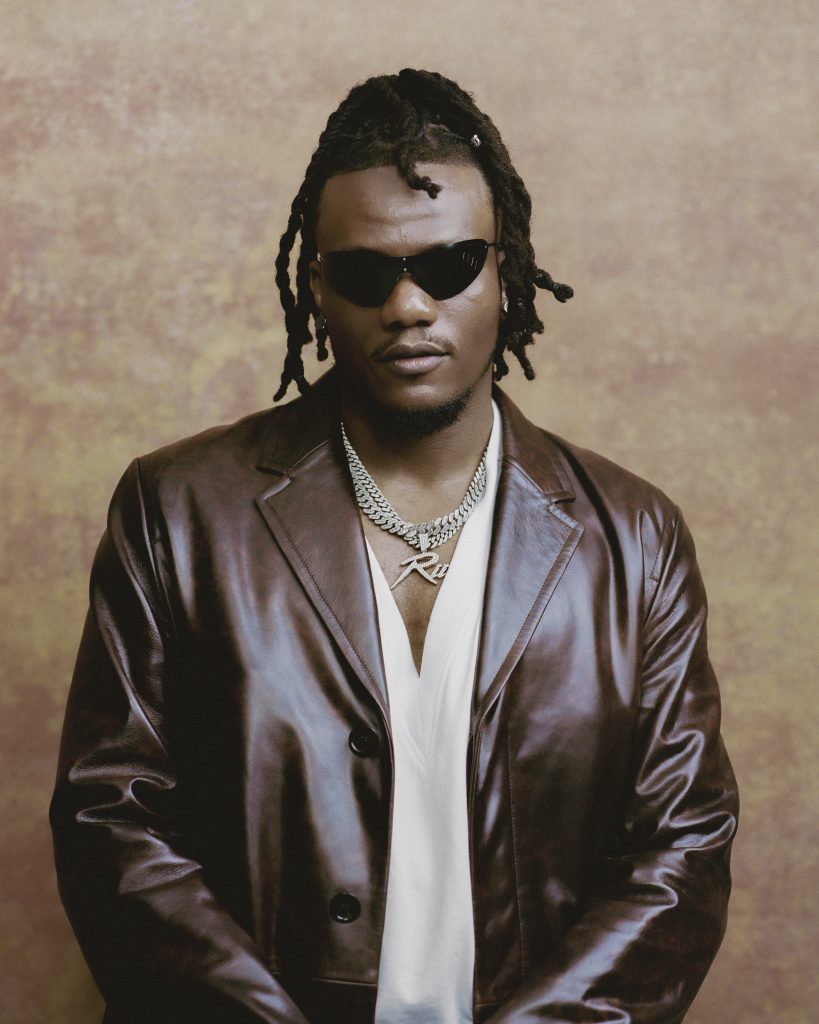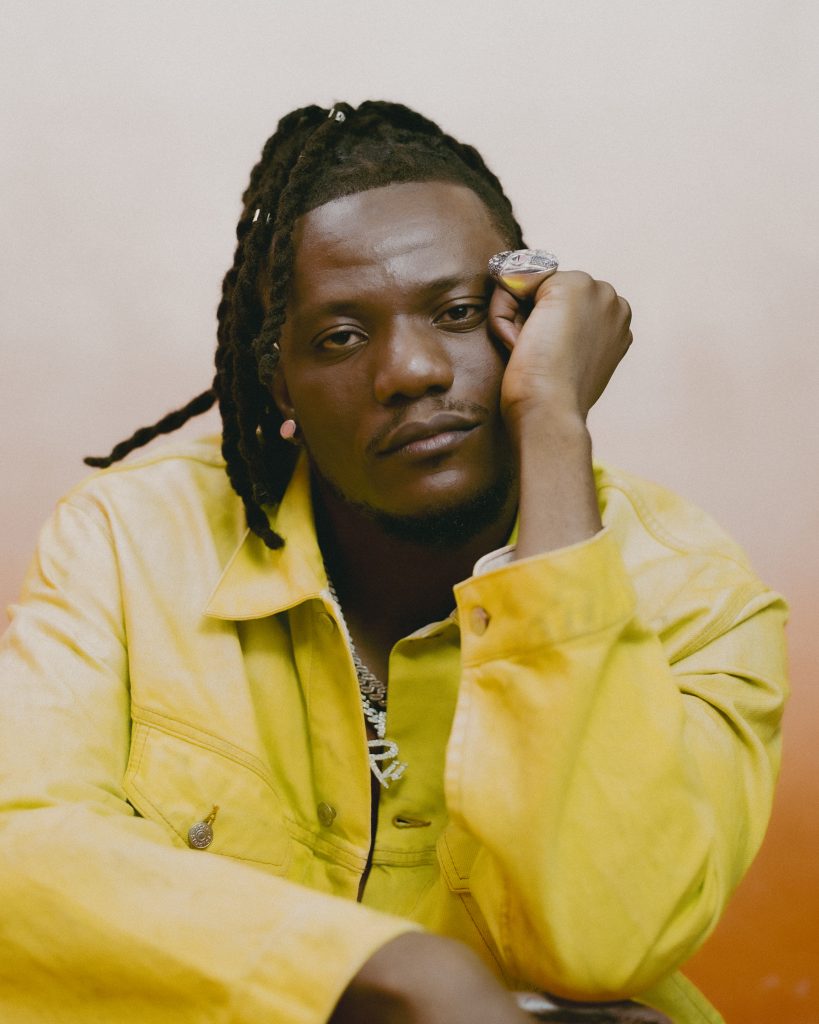Music is constantly evolving and requires that evolution. The space artists occupy depends on their active participation; without their ongoing contributions, it falters. Pheelz embodies this understanding, consistently showing up for over a decade and helping to shape the world of Afrobeats as we know it today.

Pheelz’s musical journey began remarkably early, highlighted by producing the iconic anthem ‘First of All’ with Afrobeats legend Olamide, who is not only a prolific musician but also a record executive with his own label, YBNL, known for the creative and commercial success of several Afrobeats stars like Fireboy and Asake, among others. However, for Pheelz, these were just the start of his stellar career. As a child prodigy, his relationship with music feels nothing short of extraordinary. Instruments came to him as naturally as if they were extensions of himself, akin to Apollo’s lyre to Orpheus. Remarkably, his vast skill set is entirely self-taught. He learned to play by ear, mastering keys, drums, bass, and electric guitar, dabbling in the saxophone, and even proficiently playing the piccolo at one point. Beyond music, his talents extend to art, painting, drawing, and cinematography. His abilities are not just impressive—they are awe-inspiring.
Starting 2024 with a bang, Pheelz topped Billboard’s Top Album Sales Chart thanks to his songwriting and production work on Usher’s ‘Coming Home album’. Now, he delivers ‘Pheelz Good II’, marking the culmination of his critically acclaimed ‘Pheelz Good’ trilogy series, which began last February.
With this rich backdrop in mind, I find myself virtually sitting across from Pheelz, staring at the glow of my screen. The soft hum of the fan mingles with the distant beats echoing through the room. The stage is set for a conversation that promises to explore the essence of his artistic journey, revealing the layers of a man who has dedicated his life to creating music that stands in firm defiance against all the doubts and personal misgivings that plague most self-reflecting artists.
“So, Pheelz Good II has been described as a perfect fusion between emotions and Afrobeats,” I begin.
“Yes,” Pheelz affirms. “RnB, Afrobeats; those have been parts of me growing up. I’ve always been into soulful music, the kind that really covers emotions. As a kid, I listened to them and tried to figure out how they make you feel and why they make you feel that certain way. I feel like that transcribed into what I’m trying to do with the Pheelz Good trilogy and what I’m trying to do with any music I make at the end of the day because I really believe music is one of the major keys to change humanity.”

This prompts me to ask about his inspiration for creating the trilogy.
“I try to express emotion through music, so in a way, the Pheelz Good trilogy is my attempt to interpret multiple emotions and stories through music,” he explains. “Also, I’m trying to change the world.”
Curious about his personal favorites from the album, I ask if he has a standout track.
“No, I don’t have a favorite,” Pheelz replies thoughtfully. “Each of them has their time and depends on the mood I’m in. Sometimes I want to listen to ‘Kamakaze,’ sometimes I want to dance to ‘Majo,’ sometimes I want to just vibe with the love songs. They each have their different strengths, and I appreciate them for what they are differently.”
As our conversation flows, I steer toward the opening track of Pheelz Good II, ‘Fever,’ featuring Niniola.
“Niniola is always a vibe to work with,” Pheelz begins warmly. “We actually have another song called ‘Formula.’ It was a vibe working with her. We were supposed to collaborate a while ago, but we never had the chance. When I made ‘Fever,’ she was the only person that came to mind, so I linked up with her, and she recorded her part.”
“We also recorded ‘Formula,’ and the rest, as they say, is history,” he adds, his enthusiasm palpable. Curious about his experiences working with Usher and Pharrell Williams, I ask Pheelz if he learned anything that helped him grow as an artist or producer. “Personally, I feel like I’ve always absorbed knowledge from people, not in the formal sense of them teaching me, but just by watching their work and having conversations with them,” Pheelz reflects. “These are mentors I grew up listening to, so life has favored me in a way that I can meet my idols and work with them one-on-one. They’ve left a lasting impression on me.”
He speaks passionately about these experiences, and it becomes obvious to me that the most gratifying part of being an artist is the work—the process of creating something or, indeed, the finished thing itself—but there’s another gratifying part that is rather fortunate—an excellent and eternal gratifier—the recognition of your efforts by an artist you admire. “Life is a movie, I’m not going to lie,” he adds as he considers the surreal nature of his journey. As our conversation progresses into music’s cultural impact, I ask Pheelz about Afrobeats’ rise in global popularity. Despite its long existence, Afrobeats continues to feel new, special, and urgent in its evolution. He provides insight, “Afrobeats has always been about interpreting our culture and lifestyle. It is also an interpretation of our spirits; It’s that unique factor that sets it apart. You know, shout out to everyone who is contributing to it becoming a global movement. It’s an exciting time to be Nigerian, African, and an Afrobeats artist. It’s only up from here, to be honest. I’ve been grateful to be part of the voices channeling this movement for over a decade now. It’s a beautiful experience.”

As our conversation turns to his personal growth and challenges in the music industry, I ask Pheelz about his evolution as an artist and the obstacles he’s encountered along the way.
“The challenge so far has been self-driven, actually,” Pheelz begins, reflecting deeply. “It’s not external—it’s from within.” I let out a gentle “oh,” signaling my interest in his perspective.
“You see, fame is a different beast that you have to learn to live with,” he continues, explaining further. “You learn to cope with fame internally, within your mind. It takes a mindset shift and it’s a new learning curve, in my opinion.”
As we discuss his growth and internal challenges, Pheelz’s perspective on fame prompts me to inquire about the themes explored in Pheelz Good II.
“This perspective prompts me to ask about the themes explored in Pheelz Good II,” I segue. “What stories did you choose to tell?”
“My songwriting process focuses greatly on my life,” Pheelz explains. “I talk a lot about my life—how I live, what I do. I don’t subscribe to writing about fantasies. My lyrics are like my diary; I navigate through the things I go through in my songs.” “Interesting,” I remark, intrigued by his approach. Pheelz continues, offering perceptual clarity. “For a song like ‘Kamakaze,’ it’s me navigating through mental health—anxiety, sadness, and all that,” he shares. “And for a song like ‘Majo,’ well, actually, I was inspired by a picture of Tems during the songwriting process.”
I chuckle, amused. “No, actually, it was her picture in traditional attire that inspired the song.”
“It differs, but for the most part, my songwriting has always been about my life,” Pheelz concludes, highlighting the personal nature of his creative process.
Curious about Pheelz’s hobbies outside of music, I ask, “What do you enjoy doing in your free time?”
“In my free time, I like reading, I paint a lot, and I write. I enjoy hanging out with friends, watching movies, and anime. You know, a couple of hobbies,” Pheelz responds.
“Aha, that sounds interesting,” I remark. Thinking about movies, I ask Pheelz, “If you could pick a movie that best describes your life, which one would it be and why?”
“Oh, it would be Kanye West’s Jeen-Yuhs documentary. I think in a way, we are playing the same video game,” Pheelz chuckles. “We’re playing it differently.”
“I see,” I agree, understanding his perspective. “Yeah, it will be that,” Pheelz confirms, sounding enthused.
Curious about any hidden talents Pheelz may have, I ask, “Are there any talents or hobbies outside of music that people might be surprised to learn you have?”
“It would be my 3D and visual art,” Pheelz reveals. “Outside of music, I’ve been creating a collection of art that has been for my eyes only. I think I’m a really dope artist in every sense of the word. My paintings are exceptional and special to me.”
“You should share,” I interject, half inquiring about his artwork.
“Maybe someday sha,” Pheelz responds with a hint of mystery.
Intrigued about the experience Pheelz hopes to impart through his EP, I ask, “What kind of experience do you hope people have when they listen to Pheelz Good II?”
“It’s positive energy, man. That’s the most important thing for my fans—good vibrations, high vibrations, joy, introspection on life, a range of emotions, and just generally having a great time,” Pheelz explains.
“That’s what I’d like them to take,” he adds, emphasizing his desire for his music to resonate positively with his audience. Curious about which song Pheelz considers his theme song, I ask, “If you had to pick a song that represents you, what would it be?”
“Hmm, that’s a very tough question,” Pheelz responds with a thoughtful pause. “Can I pick my own song?”

“Fair enough, pick yours,” I encourage.
“It would be ‘Kamakaze’ and ‘Majo’,” Pheelz decides.
Reflecting on his collaborative journey, Pheelz shares, “I don’t have a list anymore of people I want to work with because life has always proven to beat my list. So, I’ve learned to free it and let the music guide me wherever it takes me.” I nod thoughtfully at his perspective. “Speaking of guiding forces, what are your goals and dreams for your career, both as an artist and a producer?”
Pheelz considers for a moment before answering, “My goal basically is to vibrate higher, to be free. Because every other physical goal is up to the universe. But my goal is to find happiness, peace, success, unending joy, and fulfillment. Every other materialistic goal is up to the times we are in and the universe. But peace, clarity, those are my goals.” There might be one more project before the album,” Pheelz shares confidently, “but the album is in the works as well, and it would be one of the greatest albums anybody has ever heard in the world, period.” Reflecting on his exceptional contributions to Afrobeats, I express, “Your impact on Afrobeats has been truly exceptional. There’s so much inspiration in your journey, affirming that greatness comes to those who persevere.”
“Thank you,” Pheelz responds graciously.
As the conversation ends, I find myself confident in stating my perspective: I truly believe that Pheelz is one of the greatest minds in music right now, capable of exceptional things. Pheelz creates like he’s willing to reach up and tear the divine idea from its heavenly cradle and proffer it to the world without waiting for inspiration to find him. I have no doubt that the album will be everything he says it will.
Authored by Neone Adebayo.

Photography Elliot Hensford
Cover Design Farouk
Written Neone

